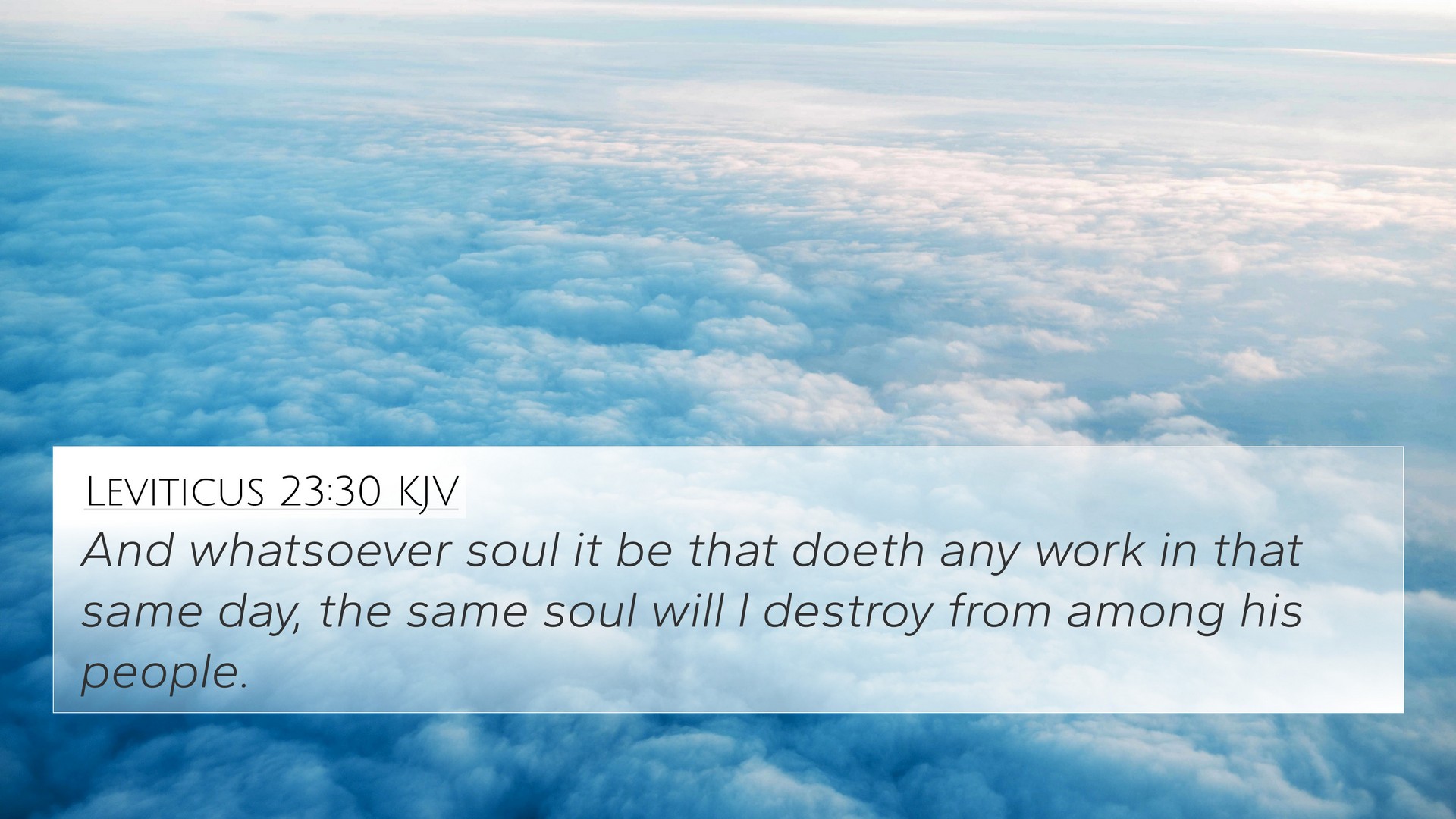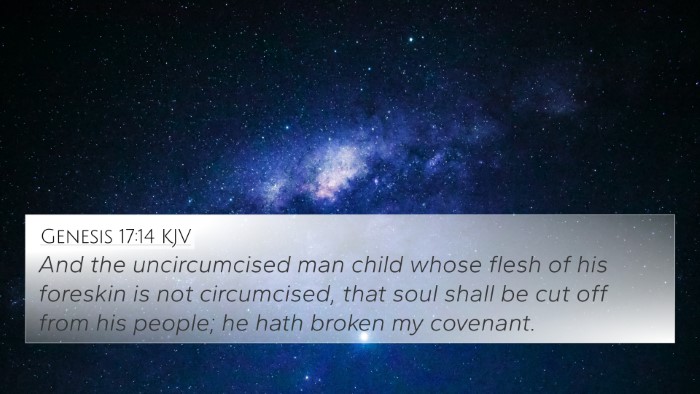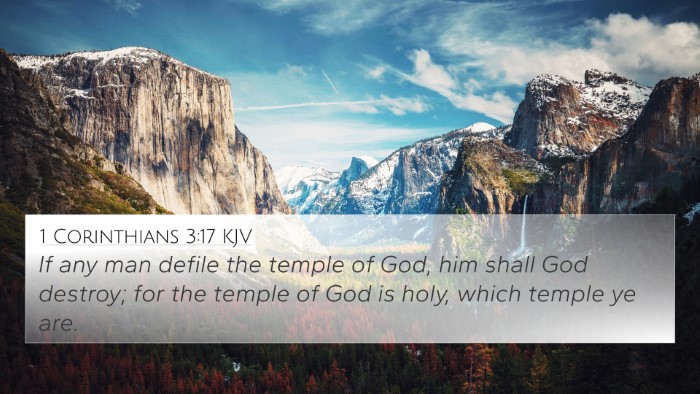Understanding Leviticus 23:30
Leviticus 23:30 states, "And whatsoever soul it be that doeth any work in that same day, the same soul will I destroy from among his people." This verse emphasizes the severity of violating the Sabbath and the importance of adhering to God's commandments regarding rest and holiness.
Summary of Biblical Commentary
This verse serves as a stark reminder of the consequences associated with disobedience to God's laws, particularly regarding the observance of holy days. Various public domain commentaries illuminate different facets of this verse:
-
Matthew Henry:
Henry notes that this passage warns the Israelites about the seriousness of transgressing the Sabbath. The penalty for doing work on the day of rest is severe and underlines the commitment required of God's people to separate themselves from their regular occupations and focus on divine worship.
-
Albert Barnes:
Barnes emphasizes the cultural context of this commandment within Israelite society, stressing that observing the Sabbath was not only a religious duty but also a societal one that allowed the community to gather for worship and reflection. He highlights the grave consequences of neglecting this command, illustrating God's holiness and the necessity for His people to reflect that holiness in their lives.
-
Adam Clarke:
Clarke discusses the implications of the penalty mentioned in this verse, explaining that it reflects God's justice. He articulates that the severity of the punishment represents the high value placed on rest and worship and serves as a reminder that disobedience leads to spiritual separation from God.
Connections to Other Scripture
Leviticus 23:30 can be cross-referenced with several other Bible verses that reinforce the theme of Sabbath observance and the consequences of disobedience:
- Exodus 31:14: "Ye shall keep the sabbath therefore; for it is holy unto you: every one that defileth it shall surely be put to death." This verse parallels Leviticus 23:30 in articulating the severe repercussions of profaning the Sabbath.
- Exodus 20:8-11: "Remember the sabbath day, to keep it holy..." This passage lays the foundation for the Sabbath commandment, connecting it to God's creation narrative.
- Numbers 15:32-36: The story of a man stoned for gathering sticks on the Sabbath further illustrates the seriousness of violating Sabbath laws.
- John 5:16-17: In the New Testament, Jesus speaks about working on the Sabbath, linking His ministry to the true spirit of rest and lawful action.
- Hebrews 4:9-10: "There remaineth therefore a rest to the people of God." This New Testament reflection emphasizes the deeper spiritual significance of the Sabbath, suggesting it points toward a rest found in Christ.
- Isaiah 58:13-14: This passage enhances the understanding of the Sabbath as a delight, contrasting it with mere rule adherence.
- Matthew 12:8: Jesus declares, "For the Son of man is Lord even of the sabbath day," indicating His authority over the Sabbath and redefining its observance.
- Colossians 2:16-17: These verses remind believers that the Sabbath was a shadow of things to come, directing focus to Christ.
- Deuteronomy 5:12-15: Reiteration of the Sabbath commandment, emphasizing remembrance of slavery in Egypt and the need for compassion.
- Mark 2:27: "The sabbath was made for man, and not man for the sabbath," demonstrating the purpose behind God's law, which is ultimately for man's benefit.
Thematic Connections
Leviticus 23:30 contributes to thematic Bible verse connections regarding:
- The Nature of God’s Commands: The need for obedience to God’s commands stems from His holiness and our call to reflect that in our lives.
- Rest and Worship: Understanding the Sabbath emphasizes the importance of setting aside time for worship, reflection, and community.
- Consequences of Disobedience: Throughout the Bible, repercussions for turning away from divine instructions create a theme of accountability and the need for repentance.
- God's Relationship with His People: The commandments further illustrate the covenant relationship, showing how God desires a sanctified people.
Practical Applications
For those seeking to understand how to engage with this passage and apply its lessons, several practical applications can be drawn:
- Embrace the Sabbath: Find ways to observe rest in modern context, recognizing it as a time for spiritual renewal.
- Study the Word: Use tools for Bible cross-referencing to explore how other scriptures inform your understanding of the Sabbath and its purpose.
- Reflect on God’s Holiness: Contemplate how God's expectations highlight His character, leading to a deeper relationship with Him.
- Engage in Community Worship: Participate in communal gatherings where believers come together to honor the Sabbath, reflecting on its significance.
Conclusion
Leviticus 23:30 serves as a profound reminder of the importance of observing God’s commandments, especially regarding the Sabbath. Through comparative Bible verse analysis and scriptural cross-referencing, we gain a deeper understanding of divine expectations and the rich tapestry of connections within the Biblical texts that inform our faith today.
By exploring the connections between Bible verses, we not only comprehend the significance of Leviticus 23:30 but also engage in a broader dialogue about rest, holiness, and our relationship with God.









